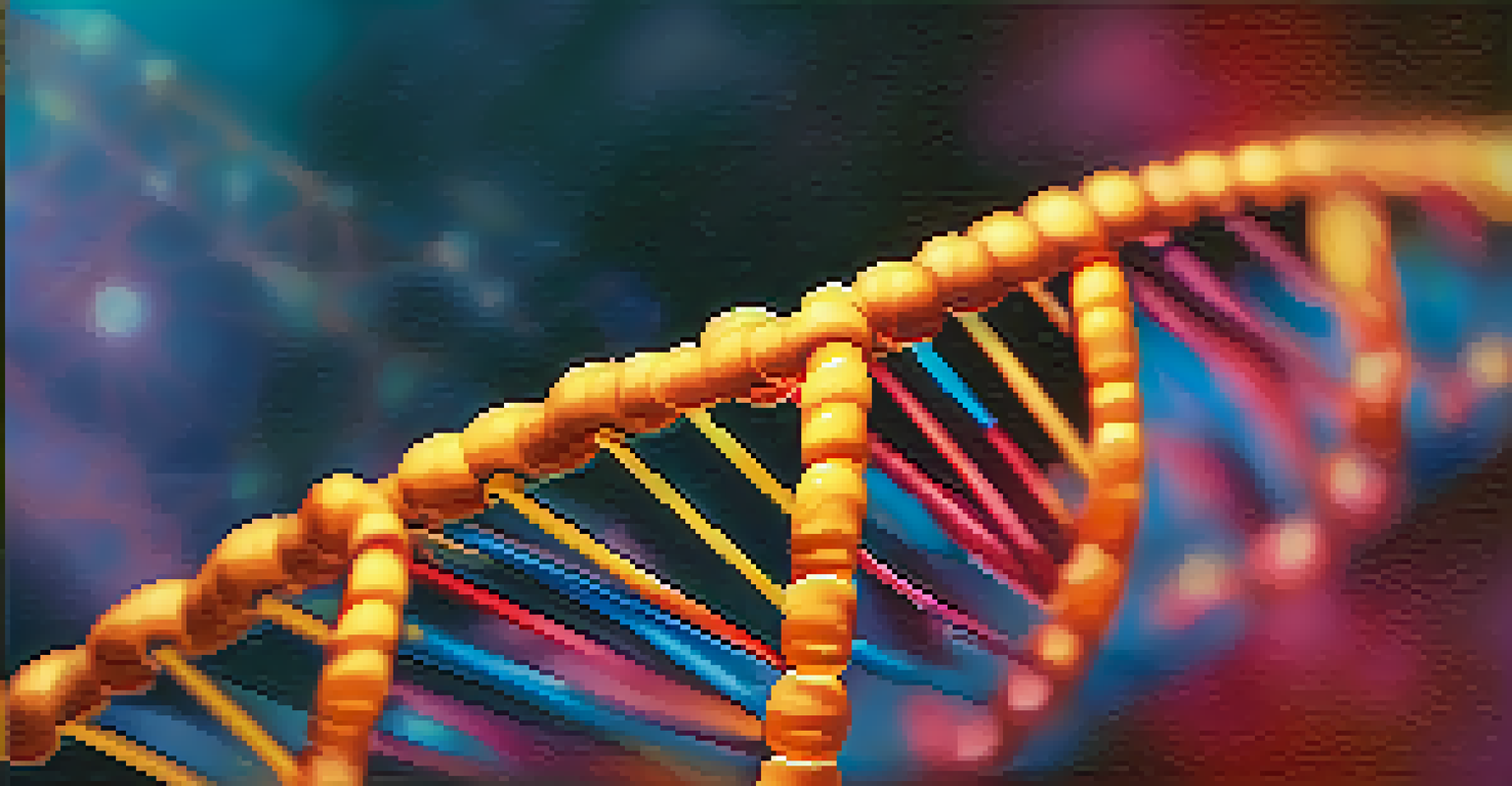Common Genetic Disorders: Insights for Genetic Counseling

What Are Genetic Disorders and Their Causes?
Genetic disorders are conditions caused by abnormalities in an individual's DNA. These abnormalities can arise from mutations, which are changes in the DNA sequence, or chromosomal alterations, where there are extra or missing chromosomes. Understanding these underlying causes is essential for both patients and healthcare providers.
Genetic disorders can be understood as the result of an intricate dance between genes and environment.
Some genetic disorders are inherited, passed down from parents to children, while others may occur sporadically due to environmental factors or new mutations. Conditions like cystic fibrosis and sickle cell anemia are examples of inherited disorders, whereas some cancers may result from acquired genetic changes. This distinction is vital for determining risk factors and potential outcomes.
Genetic counseling plays a crucial role in helping individuals understand these complexities. Counselors assess family history, explain the implications of genetic testing, and guide patients toward informed decisions regarding their health and the health of their families.
Common Genetic Disorders: An Overview
Some of the most prevalent genetic disorders include Down syndrome, Huntington's disease, and muscular dystrophy. Down syndrome, caused by an extra copy of chromosome 21, leads to developmental delays and various health issues. Huntington's disease, on the other hand, is a progressive neurodegenerative disorder that typically appears in adulthood.

Muscular dystrophy encompasses a group of disorders characterized by muscle weakness and loss of muscle mass. Each condition has its own unique symptoms and inheritance patterns, making it crucial for individuals to understand their specific situation. This knowledge empowers patients and their families to seek appropriate support and resources.
Understanding Genetic Disorders
Genetic disorders are caused by DNA abnormalities, which can be inherited or arise from new mutations.
By recognizing these common disorders, genetic counselors can tailor their approach to meet the needs of individuals and families. They provide vital information about the nature of these conditions and what to expect, fostering a supportive environment for those affected.
The Role of Genetic Testing in Diagnosis
Genetic testing is a powerful tool in diagnosing genetic disorders, allowing for early detection and management. Tests can identify specific mutations associated with various conditions, helping to confirm or rule out suspected diagnoses. This process can provide clarity and peace of mind for families navigating complex health issues.
Genetic counseling is not just about the science; it's about supporting individuals and families through their emotional journey.
There are different types of genetic tests, including carrier testing, diagnostic testing, and predictive testing. Carrier testing determines if an individual carries a gene for a recessive disorder, while diagnostic testing confirms a diagnosis in individuals with symptoms. Predictive testing can assess the risk of developing certain conditions later in life, providing crucial information for proactive health management.
Understanding the nuances of genetic testing is essential for effective counseling. Genetic counselors help patients interpret test results, discuss their implications, and explore available options, ensuring that individuals are well-informed and supported throughout the process.
Understanding Inheritance Patterns
Genetic disorders can follow different inheritance patterns, which influence how traits are passed from one generation to the next. The most common patterns include autosomal dominant, autosomal recessive, and X-linked inheritance. Knowing these patterns helps families understand their risk of passing on disorders to their children.
In autosomal dominant disorders, only one copy of the mutated gene is enough to cause the condition. This often results in a 50% chance of passing the disorder to offspring. Conversely, autosomal recessive disorders require two copies of the mutated gene for the condition to manifest, meaning that both parents must be carriers for the disorder to be inherited by their children.
Importance of Genetic Testing
Genetic testing aids in diagnosing disorders and helps families make informed health decisions.
X-linked disorders, often affecting males more severely, are linked to genes on the X chromosome. Understanding these patterns not only aids in risk assessment but also provides families with the information needed to make informed reproductive choices, enhancing their overall well-being.
The Emotional Impact of Genetic Disorders
The diagnosis of a genetic disorder can bring about a whirlwind of emotions for individuals and families. Feelings of fear, anxiety, and uncertainty are common, as patients may worry about their future health or the health of their children. Recognizing and addressing these emotional responses is a key aspect of genetic counseling.
Genetic counselors provide support by creating a safe space for individuals to express their feelings and concerns. They can help families navigate the emotional landscape, offering coping strategies and resources to manage stress and anxiety. This holistic approach is vital in ensuring that both the physical and emotional needs of patients are met.
Additionally, connecting with support groups and communities can foster a sense of belonging and understanding. Sharing experiences with others who face similar challenges can be incredibly beneficial, reinforcing that no one is alone in their journey.
Ethical Considerations in Genetic Counseling
Ethical dilemmas often arise in genetic counseling, particularly regarding issues of privacy, informed consent, and potential discrimination. Patients must feel confident that their genetic information will be handled sensitively and confidentially. Genetic counselors are trained to navigate these complexities while prioritizing the rights and autonomy of their clients.
Informed consent is another critical aspect, ensuring that patients fully understand the implications of genetic testing and the potential consequences of their choices. This includes discussing the risks of revealing genetic information and the possibility of insurance discrimination, which can be a significant concern for many families.
Emotional Support Matters
The impact of a genetic disorder diagnosis can be profound, and emotional support is crucial for affected individuals and families.
By addressing these ethical considerations, genetic counselors can help patients make informed decisions that align with their values and beliefs. This fosters trust and openness, allowing for a more effective counseling experience.
The Future of Genetic Counseling and Research
The field of genetic counseling is evolving rapidly, driven by advancements in genetic research and technology. As our understanding of genetics deepens, new therapies and interventions are emerging, offering hope for those affected by genetic disorders. Personalized medicine, which tailors treatment based on an individual's genetic makeup, is becoming increasingly prominent.
Moreover, ongoing research into gene editing technologies, such as CRISPR, holds the potential to correct genetic mutations at their source. While these advancements present exciting possibilities, they also raise important ethical questions that will need to be addressed as the field progresses.

As genetic counselors continue to adapt and grow alongside these developments, their role will remain vital in guiding patients through the complexities of genetic disorders. By staying informed and proactive, they can offer the best support and resources for individuals and families navigating these challenges.